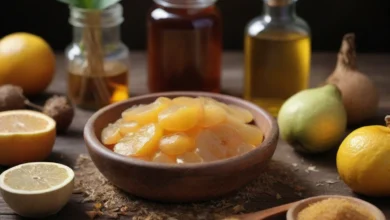How to Alleviate Joint Pain Naturally and Easily: 8 Simple Remedies You Can Try at Home

Joint pain is a common issue that affects many people, especially as they age or after physical activity. Whether you suffer from chronic conditions like arthritis or experience occasional discomfort due to overexertion, joint pain can be a major hindrance to your daily life. While over-the-counter medications may offer relief, they often come with side effects. Fortunately, there are numerous natural remedies you can use to alleviate joint pain safely and effectively at home. In this article, we’ll explore 8 simple, natural solutions that can help soothe your joints and bring you lasting relief.
1. Turmeric – A Natural Anti-Inflammatory
Turmeric, the golden spice commonly found in Indian cuisine, is renowned for its potent anti-inflammatory properties. Curcumin, the active compound in turmeric, has been shown to reduce inflammation in the joints, making it a powerful ally for those suffering from conditions like arthritis. Regular consumption of turmeric can also help reduce pain and improve mobility.
How to Use:
Mix one teaspoon of turmeric powder in a glass of warm water or milk and drink it once a day. Alternatively, you can take turmeric supplements, but always consult your doctor first to ensure the dosage is right for you.
2. Ginger – A Natural Pain Reliever
Ginger has been used for centuries as a natural remedy for pain and inflammation. Its active compounds, such as gingerols, have been shown to inhibit the production of inflammatory compounds in the body. This makes ginger an excellent choice for managing joint pain, especially in conditions like osteoarthritis.
How to Use:
You can make a simple ginger tea by boiling fresh ginger slices in water for 10 minutes. Drink this tea once or twice daily to experience the anti-inflammatory benefits. Alternatively, ginger supplements are available in capsule form for those who prefer a more convenient option.
3. Epsom Salt Soak – Relieving Tension and Reducing Swelling
Epsom salt is rich in magnesium, which is known to help relax muscles and ease joint pain. A warm Epsom salt bath can help reduce swelling, relieve muscle tension, and ease joint stiffness. This remedy is particularly effective for those dealing with muscle soreness or arthritis-related pain.
How to Use:
Add 1-2 cups of Epsom salt to warm bath water and soak in it for about 20 minutes. Repeat this 2-3 times a week to relieve pain and improve joint flexibility.
4. Essential Oils – Natural Healing for Joint Pain
Essential oils such as peppermint, lavender, and eucalyptus are well-known for their pain-relieving properties. These oils have soothing effects that can reduce inflammation and alleviate pain in the joints. Their cooling or warming sensation helps relax the muscles and improves blood circulation, providing quick relief from pain.
How to Use:
Mix a few drops of your chosen essential oil (like peppermint or eucalyptus) with a carrier oil such as coconut or olive oil. Massage the mixture into the affected joints for fast pain relief. You can also use a diffuser to inhale the calming effects of essential oils.
5. Warm and Cold Compress – Simple Yet Effective Relief
Both heat and cold treatments have been proven to relieve joint pain. Cold compresses help reduce inflammation and numb the area, while heat can relax the muscles and improve blood flow to the area, promoting healing. Alternating between hot and cold treatments can be highly effective in reducing joint discomfort.
How to Use:
Apply a cold compress (such as an ice pack wrapped in a towel) to the affected joint for 15-20 minutes to reduce inflammation. Afterward, switch to a warm compress or heating pad for 15-20 minutes to relax the muscles and improve circulation. Repeat this process 2-3 times a day for optimal results.
6. Omega-3 Fatty Acids – A Natural Anti-Inflammatory
Omega-3 fatty acids, found in fish like salmon and mackerel, as well as in flaxseeds and walnuts, have been shown to reduce joint inflammation. Regular consumption of omega-3-rich foods can help alleviate pain and improve joint function, especially for those with rheumatoid arthritis.
How to Use:
Incorporate more omega-3-rich foods into your diet, such as fatty fish, flaxseeds, chia seeds, and walnuts. If it’s difficult to get enough from food alone, omega-3 supplements can be an effective alternative. However, consult with your healthcare provider for proper dosage recommendations.
7. Apple Cider Vinegar – Alkalizing the Body to Relieve Pain
Apple cider vinegar (ACV) is known for its ability to reduce inflammation and ease joint pain. It contains acetic acid, which can help balance the body’s pH and reduce swelling in the joints. It also promotes detoxification, which may contribute to overall joint health.
How to Use:
Mix 1-2 tablespoons of apple cider vinegar in a glass of warm water and drink it once or twice a day. You can also apply diluted ACV directly to sore joints for topical relief. Always remember to dilute ACV before applying it to your skin to avoid irritation.
8. Exercise – A Key to Joint Health
While it may seem counterintuitive, regular low-impact exercise is crucial for joint health. Activities such as walking, swimming, and cycling help keep the joints flexible, strengthen muscles, and reduce pain. Exercise can also increase the production of synovial fluid, which lubricates the joints and reduces stiffness.
How to Use:
Incorporate low-impact activities like swimming, cycling, or yoga into your routine. Aim for at least 30 minutes of moderate exercise most days of the week. Stretching exercises specifically designed for joint mobility can also help alleviate stiffness and improve flexibility.
Frequently Asked Questions About Joint Pain Relief Naturally
1. How often should I apply these natural remedies?
It’s best to apply these remedies consistently to see long-term results. For example, incorporating turmeric or ginger into your diet daily can provide cumulative benefits. Similarly, warm and cold compresses can be applied several times a day for immediate relief. Remember, everyone’s body is different, so listen to your body and adjust the frequency accordingly.
2. Can these natural remedies be used with prescription medication?
Yes, most natural remedies for joint pain can be safely used alongside prescribed medications. However, it’s always a good idea to check with your healthcare provider to ensure there are no contraindications, especially if you’re taking blood thinners or other medications that may interact with natural supplements.
3. How long will it take to see results?
The effectiveness of natural remedies can vary depending on the individual and the severity of the joint pain. Many people begin to feel relief within a few days or weeks of consistent use. However, for chronic conditions like arthritis, it may take longer to notice significant improvements.
Conclusion
Joint pain can be a frustrating and debilitating condition, but with the right natural remedies, you can find effective relief without the need for harsh chemicals or medications. From anti-inflammatory ingredients like turmeric and ginger to soothing treatments like essential oils and Epsom salt baths, there are numerous ways to alleviate joint pain naturally. By incorporating these remedies into your daily routine, you can enjoy improved joint health, increased mobility, and a higher quality of life.





